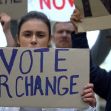A Fort Worth, Texas woman is seeking to get her conviction of illegal voting charges overturned by the Texas Court of Criminal Appeals.
Crystal Mason, a Black woman from Fort Worth, Texas, cast a provisional ballot in the 2016 presidential election. Mason says she cast her provisional ballot on the advice of a poll worker. Like many provisional ballots, hers was ultimately not counted.
According to her illegal voting charges, Mason was never eligible to cast a vote because she was on supervised release for a separate federal tax fraud conviction. Mason maintains that she was unaware that it would be illegal for her to exercise her civic duty. Under Texas law, convicted felons are allowed to vote, but Mason would have needed to complete her previous tax fraud sentence first before she could vote again.
Crystal Mason Appeals to Highest Court in Texas
As Mason prepares with her attorneys to take her case to the highest court in the state, she also has the support of the American Civil Liberties Union of Texas, the national ACLU, and the Texas Civil Rights Project. Mason, along with her legal team, maintains that she did not intend to vote illegally. In a statement released by ACLU Texas, her representatives explain, “Mason never wanted to be a voting rights advocate. She never wanted to be on the news or have her name become a rallying point in a politically divisive battle. Hers is a textbook case for why provisional ballots were created and why they must not be criminalized. Crystal’s fight is a fight for every Texan.”
In addition to her using a provisional ballot the way it was meant to be used, her legal team points to the fact that her vote was ultimately not counted.
Mason’s conviction of illegal voting comes with a five-year prison sentence. After her case was heard in the trial court, it was taken to the state appellate court, where her conviction was left in place. A panel of three judges in the appellate court affirmed the trial court's decision. Interestingly enough, the appellate court did agree with Mason on her stance that she did not know she was ineligible to vote in her state.
Mason’s representatives are hoping that by taking the case to the Texas Court of Criminal
Appeals, the court can take a closer look at whether or not Mason’s standing conviction with a five-year prison sentence is just. ACLU Texas points to a similar case in DeLay v. State in which the Texas Court of Criminal Appeals threw out Tom DeLay’s conviction because the court ruled that such accused individuals should actually know that they broke the law and violated the Election Code.
Furthermore, Mason’s attorney points to Mason's good faith in exercising her civic duty even though she was unaware she was ineligible to vote. A conviction in this case goes against the Federal Help America Vote Act, according to Mason’s lawyer.
Mason has shared a statement through the ACLU Texas in which she expresses, “I'm more energized than ever before, and I refuse to be afraid. I thought I was performing my civic duty and followed the election process by filling out a provisional ballot. By trying to criminalize my actions, Texas has shown me the power of my voice. I will use my voice to educate and empower others who are fighting for their right to vote.”
How Do Provisional Ballots work?
In taking precautionary voting measures, Mason, like many other unsure American voters, used a provisional ballot. When voters have questions about their voting status, they can vote with what is called a provisional ballot (in New York it is called an affidavit ballot).
A provisional ballot essentially allows a person to cast a vote even if they have doubts about whether or not they are allowed to do so. However, for a provisional ballot to be counted, the voter's eligibility must be resolved. Provisional ballots can be cast for a variety of reasons, including but not limited to,
- Issues with voting using an absentee ballot they asked for
- Voters lacking a photo ID
- A voter's eligibility is unable to be established
- A voter's name does not appear on the electoral roll at their voting location.






